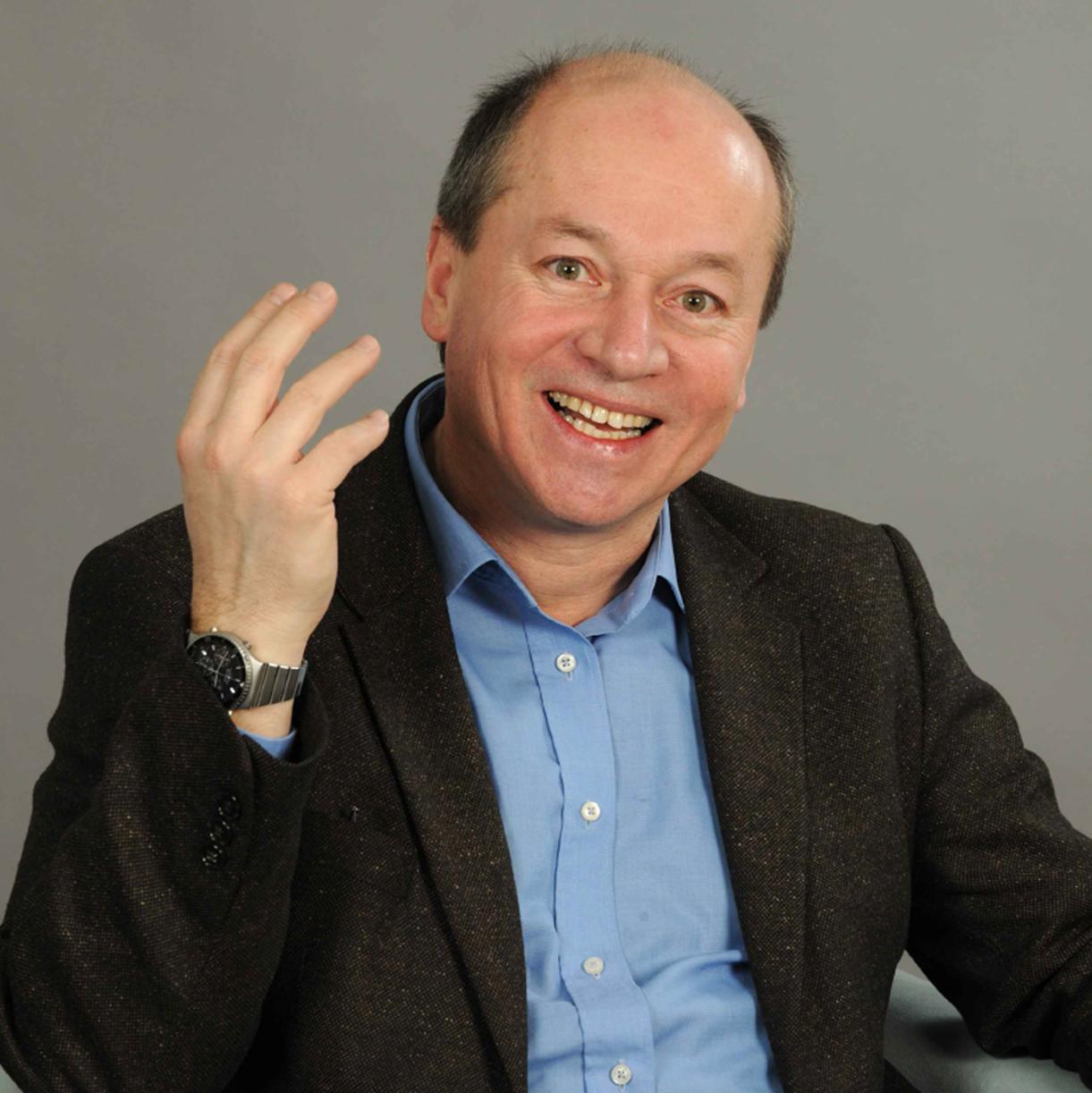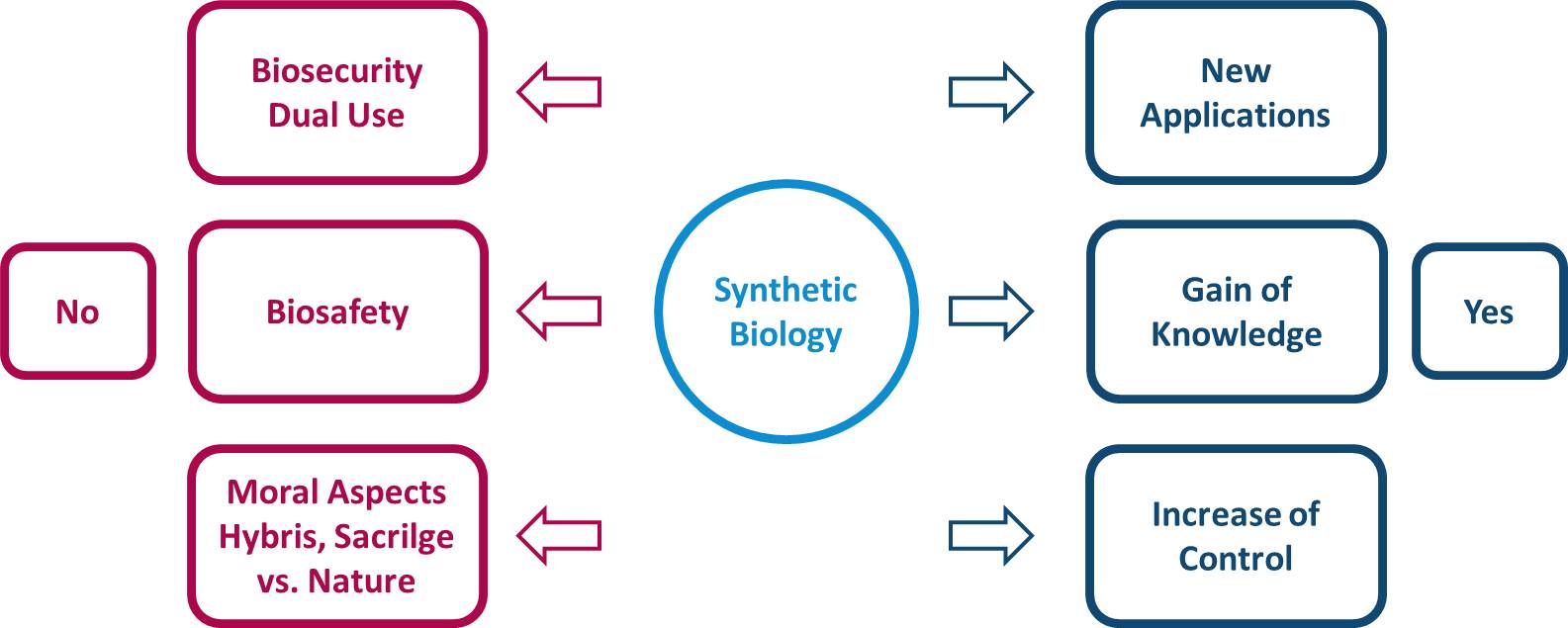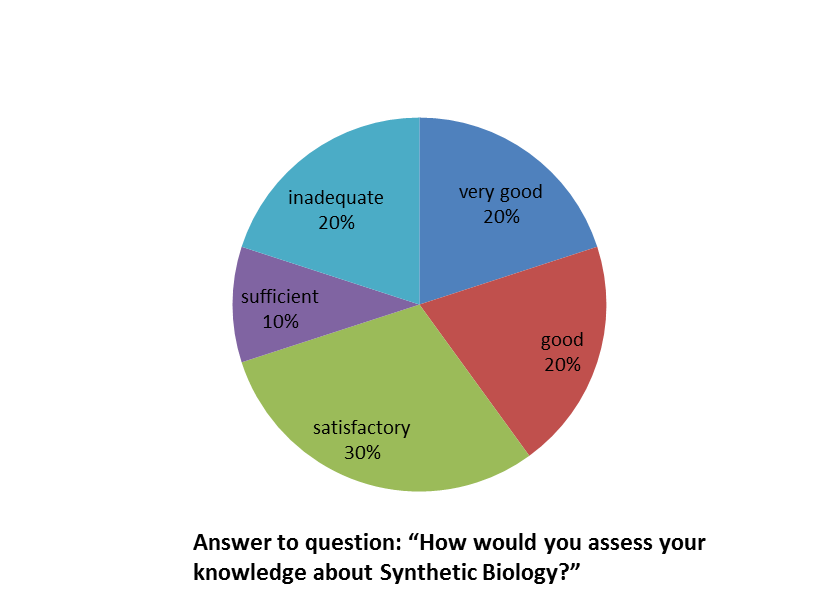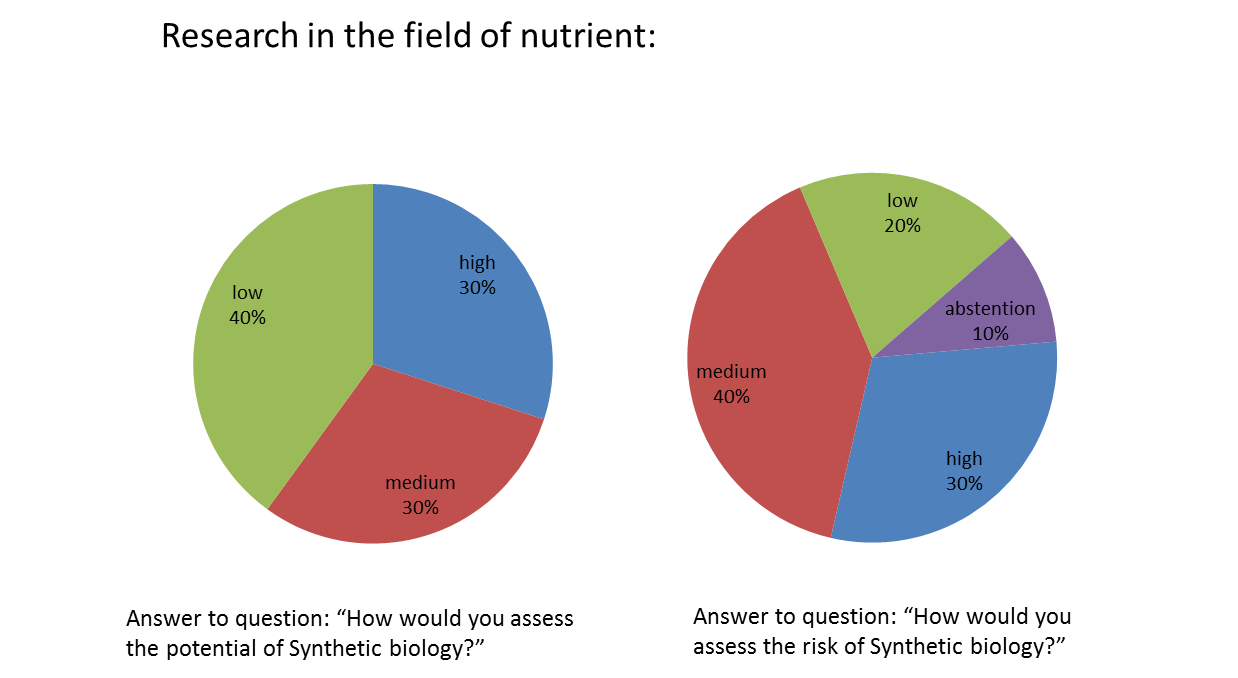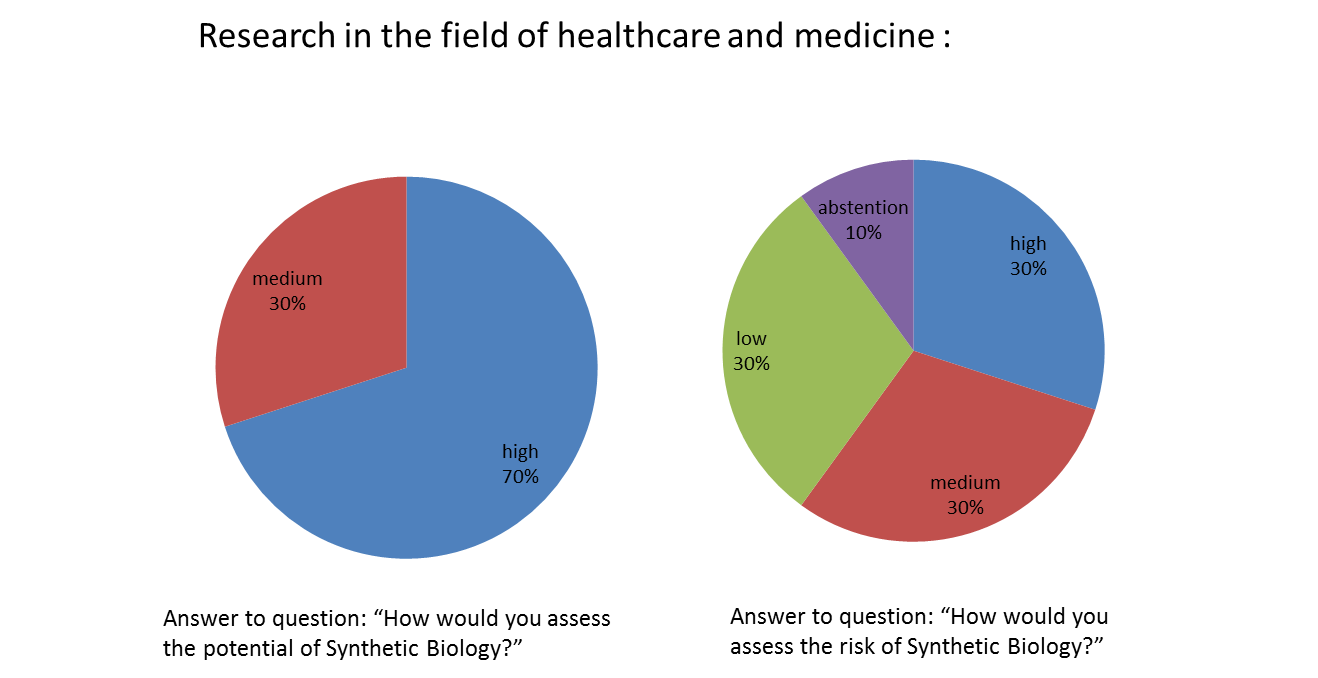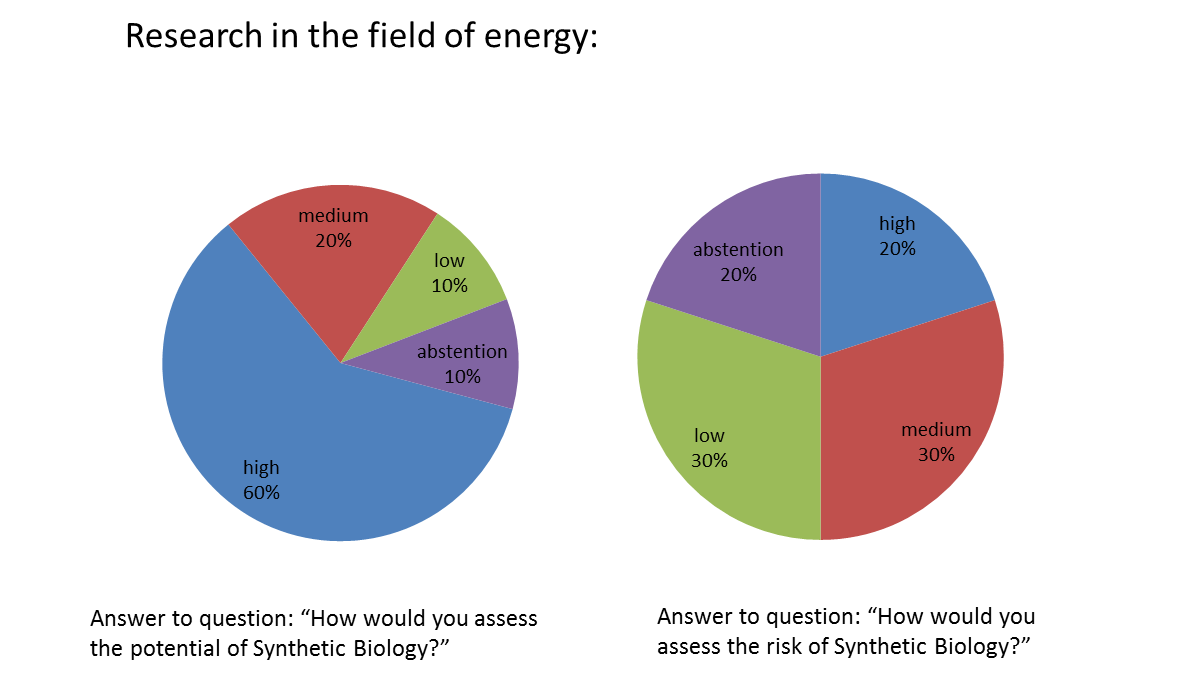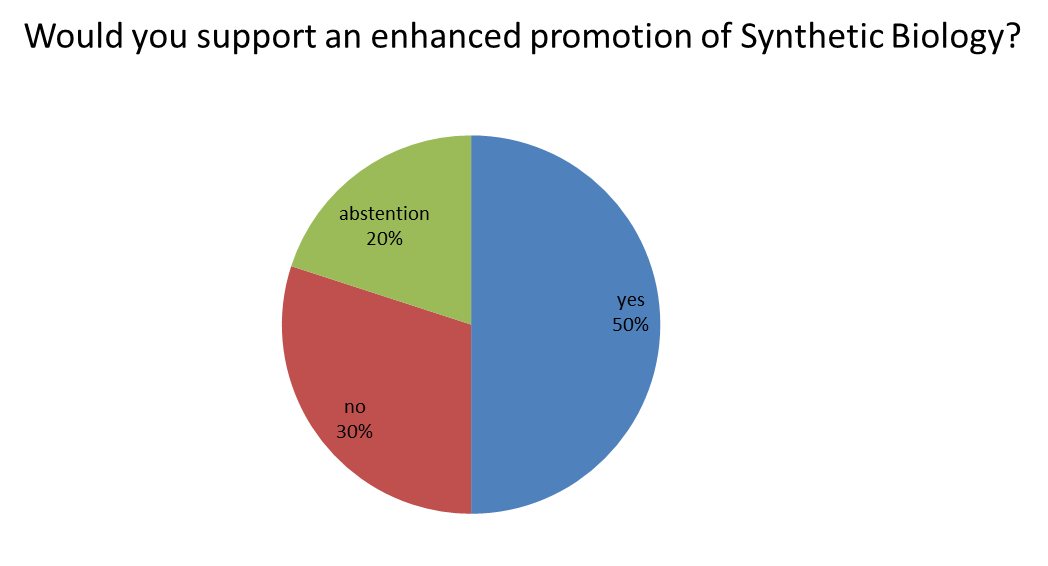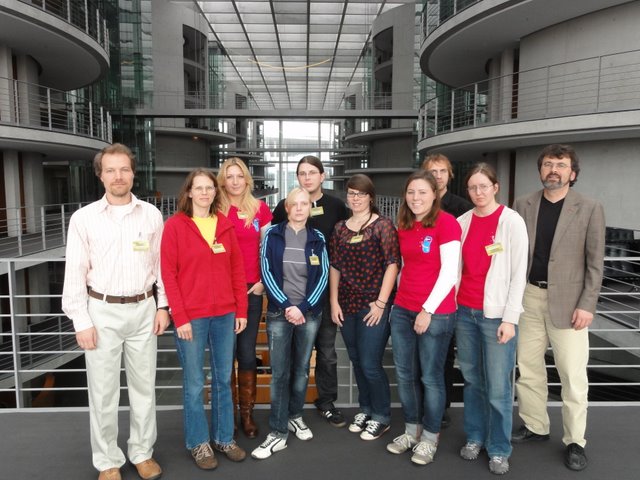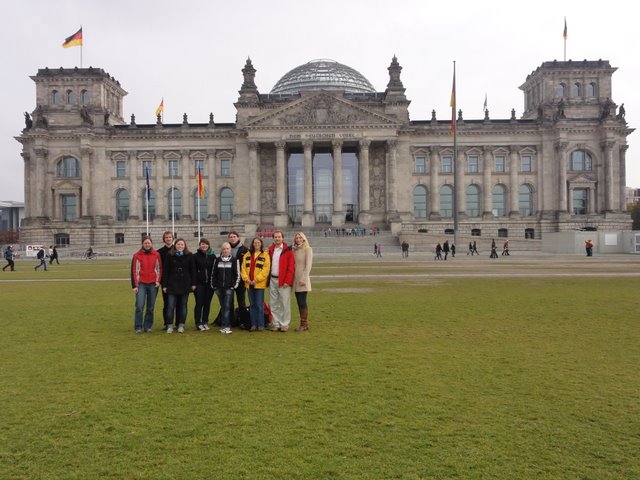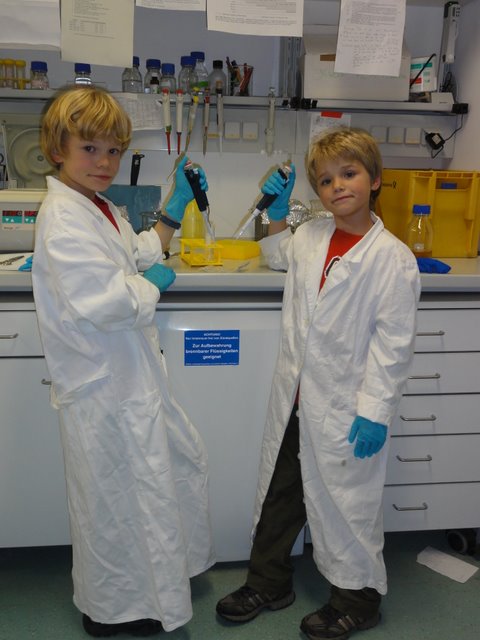Team:Potsdam Bioware/Safety Ethics
From 2011.igem.org
(→Potsdam_Bioware at the German parliament) |
(→Potsdam_Bioware meeting a member of the German parliament) |
||
| (20 intermediate revisions not shown) | |||
| Line 80: | Line 80: | ||
In order to determine the general consensus on synthetic biology we generated a survey about the opinion of the members of the German parliament. The aim of this survey was to figure out what the members of the parliament think about “synthetic biology” and how the future of synthetic biology in Germany might look like. | In order to determine the general consensus on synthetic biology we generated a survey about the opinion of the members of the German parliament. The aim of this survey was to figure out what the members of the parliament think about “synthetic biology” and how the future of synthetic biology in Germany might look like. | ||
| - | This survey was sent to 637 members of the German parliament. 15 Members answered and 10 of them attended the survey. The participation was around 2.22 percent. Furthermore, Mr. René | + | This survey was sent to 637 members of the German parliament. 15 Members answered and 10 of them attended the survey. The participation was around 2.22 percent. Furthermore, Mr. René Roespel invited us to discuss about synthetic biology. |
Survey: [[File:Survey.pdf]] | Survey: [[File:Survey.pdf]] | ||
| Line 112: | Line 112: | ||
This survey also shows a positive trend for the enhancement of research in the field of synthetic biology by the German government. Mainly the members of the parliament regard the field of healthcare, medicine and energy research as having great potential for the future of synthetic biology. | This survey also shows a positive trend for the enhancement of research in the field of synthetic biology by the German government. Mainly the members of the parliament regard the field of healthcare, medicine and energy research as having great potential for the future of synthetic biology. | ||
<br><br> | <br><br> | ||
| - | === Potsdam_Bioware | + | === Potsdam_Bioware meeting a member of the German parliament === |
| - | In our survey we asked politicians about the potential and risks of Synthetic Biology. | + | In our survey we asked politicians about the potential and risks of Synthetic Biology. We only got a few answers, which is a statement by itself. This outcome raised some questions: What should we expect from non-scientists? What do they know about Synthetic Biology!? Having this in mind, how can they judge Synthetic Biology, if they do not even know what it means?<br> |
| - | + | That is why we were very lucky that Mr. René Röspel, a member of the German Parliament and of the party SPD (Sozialdemokratische Partei Deutschland/ Social democratic party of Germany) invited us to the governmental Paul-Loebe House in Berlin on the 27th October as a response to the survey. He holds a diploma degree in biology and closely follows governmental actions in Synthetic Biology. We had a vivid discussion with him and his group about Synthetic Biology, its advantages and disadvantages for the community, its potential, as well as the differentiation of Synthetic Biology from classic gene- or biotechnology. We presented them our project and our perspective on Synthetic Biology.<br> | |
| - | That is why we were | + | |
| - | Synthetic Biology is the | + | Synthetic Biology is the mindset to use and combine principles and modularity of nature with technical ideas in order to achieve useful systems. We pointed out that Synthetic Biology is a combination of research fields. It is a connection of biology, chemistry, physics, informatics and engineering. There are no clear defined borders between Synthetic Biology, molecular biology, biochemistry and gene- or biotechnology. Synthetic Biology links life sciences and engineering, which provides enormous potential. The discussion with Mr. Röspel revealed that Synthetic Biology is more controversial in Germany compared to other (European) countries. In Germany many people are skeptical about technology involving gene manipulation. We learned that it will be our task to dismantle these concerns and make people understand the potential of Synthetic Biology.<br> |
| - | [[Image:UP_bundestag_640.JPG]] | + | [[Image:UP_bundestag_640.JPG|left|420px|thumb| Our Team and Mr. Roespel at the right]] |
| + | [[Image:UP_vor-bundestag_640.JPG|right|420px|thumb|Our team in front of the German "Bundestag".]] | ||
| + | <br><br><br><br><br><br><br><br><br><br><br><br><br><br><br><br><br><br> | ||
=== Statement of the German government === | === Statement of the German government === | ||
| Line 184: | Line 185: | ||
University of Potsdam (German)<br> | University of Potsdam (German)<br> | ||
http://www.uni-potsdam.de/pm/news/archiv/up/date/2011/07/04/2011-135.html | http://www.uni-potsdam.de/pm/news/archiv/up/date/2011/07/04/2011-135.html | ||
| + | <br> | ||
| + | <br> | ||
| + | ===Meeting the young minds=== | ||
| + | <br> | ||
| + | Children are the future and will follow our footsteps, if we guide them. We cannot start early enough to awake their interest in research by letting them feel like real scientists in the lab. Children are open minded and want to discover everything. It’s easy to inspire them with our work. The earlier we start to introduce people to science, the better are the chances to create endorsement and interest instead of fear and refusal of synthetic biology. | ||
| + | <br> | ||
| + | Therefore, we took the initiative and invited kids to our lab. We gave them a short and easy description of our work and aims at an adequate level. They assisted us at the lab and enjoyed tasks like pipetting. It was such a pleasure to see the fascination in their bright eyes. We think that such positive memories will last a lifetime. | ||
| + | <br> | ||
| + | |||
| + | [[File:UP_kids-1.JPG|left|400px|thumb|]] | ||
| + | [[File:UP_kids-2.JPG|right|400px|thumb|]] | ||
Latest revision as of 02:11, 29 October 2011
Safety & Ethics
Safety Assessment
Our iGEM project requires only the handling of the non-pathogenic, non-adherent Escherichia coli K12 and B strains and the well-established filamentous phage. Both, the bacteria and the phage are commonly used chassis in laboratories and pose no risk when handled according to the mandatory rules. As all of us are well briefed about laboratory safety and biohazard regulations we follow these at all times. In Germany, work with genetically modified organisms is regulated by the ‘Law on Gene Technology’ (Gesetz zur Regelung der Gentechnik, GenTG). According to these rules, the responsible governmental authorities of the state of Brandenburg have been notified about our work. Following these rules, there should not be a significant danger neither to the environment nor to team members.
The most important issues we discussed are the consequences of the error-prone PCR we use to modify our parts. We tried to estimate the chances of generating highly toxic proteins. Surveying the literature, we found several reports about natural variants of microviridins and one rational mutational study, but no reports on toxic effects. As cyanobacteria can also produce toxic compounds (non-ribosomal peptides named microcystins) toxicity testing is well established in the cyanobacteria research community, and obviously, testing did not identify toxic effects. Therefore, we assume that our mutations will not have any hazardous effects. Additionally, the obtained, constructed, and planned plasmids contain only previously described parts without any known risk potential. Therefore, as far as we can foresee, our constructed BioBricks will not have or trigger any toxic effects or be critical in any way for the environment. This means that only a negligible risk arises from our used methods and constructs to the environment, the public and the team members. Last but not least, we do not see any particular danger of abuse or other security threat of our work, since it is specifically addresses scientific questions. It is our goal that the health of mankind and the environment benefit from our research.
Safety Questions
- Would any of your project ideas raise safety issues in terms of: researcher safety, public safety, or environmental safety?
- No, our project is not raising any of these safety issues.
- Do any of the new BioBrick parts (or devices) that you made this year raise any safety issues? If yes, did you document these issues in the Registry? How did you manage to handle the safety issue? How could other teams learn from your experience?
- No, our BioBrick parts or devices are not going to raise any safety issues.
- Is there a local biosafety group, committee, or review board at your institution? If yes, what does your local biosafety group think about your project? If no, which specific biosafety rules or guidelines do you have to consider in your country?
- In Germany, work with genetically modified organisms is regulated by the ‘Law on Gene Technology’ (Gesetz zur Regelung der Gentechnik, GenTG). According to these rules, the responsible governmental authorities of the state of Brandenburg have been notified about our work. Our work was classified as biosafety level 1.
- Do you have any other ideas how to deal with safety issues that could be useful for future iGEM competitions? How could parts, devices and systems be made even safer through biosafety engineering?
- So far biosafety assessment is primarily based on the characterization of wild-type devices or systems. For synthetic biology these rules should be extended to better represent the variations made by synthetic biology approaches. In addition to the continuous evaluation of safety and security, a section on technological impact assessment should be added.
Ethics Seminar
Seminar: "From engineer to creator: a controversy"
On the 5. July 2011 the iGEM Team Potsdam hosted a lecture about ethics in the field of synthetic biology. As guest speaker we were able to welcome Prof. Dr. Ralf Stoecker, professor of philosophy at the University of Potsdam and also member of the board of the Academy for Ethics in Medicine. This lecture was not only for the iGEM Team itself, but for all students with different fields of study. Through advertisement in different departments a audience with different background was the result. Starting with a general overview in the history of philosophy regarding the metaphysics of morals and the example of Immanuel Kant, Prof. Dr. Stoecker tried to explain the difficulty of ethics in modern times.
Kant started to think about general ideas concerning actions of humans a priori [4]. Philosopher often try to
adapt these moral principles to certain specific cases. Nowadays they are confronted with the problem of a
fast development in science and new applications. It is not any more possible to think first about a general
principle and then adapt these to the new results. Today the society often needs an answer to a moral
problem in short time, because the applications are needed or will be commercialize anyway. One can then
try, to extract from the concrete problem e.g. synthetic biology in medicine general principles. This way is part
of the applied philosophy.
To represent this current problem in finding a ethic view on synthetic biology, Prof. Dr. Stoecker suggested a
field of forces, where different positive and negative effects pull at the decision to use synthetic biology in
research for new applications. In conclusion, the ethic or moral decision for a new case in not determined by
higher general principles. It is a combination and weighing of different positive and negative aspects.
We tried to find relative clear examples for advantages and disadvantages of synthetic biology. One should always remind himself, that the different aspects have different weight for each individual. While the iGEM competition is a good example for advantages of synthetic biology e.g. new applications and teaching of new knowledge, Miller and Selgelid [5] show in their paper, that new applications in biology also can used for military use . The „lone operator” scenario by Tucker and Zilinkas [6] is also a good example for possible biosafety problems. In this unlikely scenario one professional researcher follows his own terrorist goal. Still these examples show disadvantages which one has to consider, when trying to make his decision.
Literature
[1] McKie, R. (2003), 'Fluorescent fish' give the green light to GM pets, The Observer, Sunday 15
[2] Balmer, A. and Martin, P., (2008), Synthetic Biology Social and Ethical Challenges, Institute for Science and Society University of Nottingham
[3] Maynard, A. (2008), Synthetic biology, ethics and the hacker culture, on http://2020science.org/2008/06/13/8613-synthetic-biology-ethics-and-the-hacker-culture/ (12.09.2011)
[4] Kant, Immanuel. Foundations of the Metaphysics of Morals. Trans. Lewis White Beck Standard edition of Königliche Preussische Akademie der Wissenschaften. Berlin, 1902–38.
[5] Miller S. and Selgelid, M., (2006), Ethical and philosophical consideration of the Dual-use dilemma in the biological sciences. Centre for Applied Philosophy and Public Ethics, Australian National University and Charles Sturt University, Canberra, Australia
[6] Tucker, J.B., Zilinskas, R.A., (2006), The promise and perils of synthetic biology, The Atlantis news, spring 2006
[7] Habermas, J. (2003): The Future of Human Nature. Cambridge (UK), Malden/MA: Polity
Survey
In Germany, synthetic biology is starting to gain more importance in academic research. However, the ethical issues and potential risks associated with it, are a major concern for the general public. So far, the German government did only fund the opinion-forming process but not synthetic biology projects in natural sciences.
In order to determine the general consensus on synthetic biology we generated a survey about the opinion of the members of the German parliament. The aim of this survey was to figure out what the members of the parliament think about “synthetic biology” and how the future of synthetic biology in Germany might look like.
This survey was sent to 637 members of the German parliament. 15 Members answered and 10 of them attended the survey. The participation was around 2.22 percent. Furthermore, Mr. René Roespel invited us to discuss about synthetic biology.
Survey: File:Survey.pdf
- 1. How would you assess your knowledge about Synthetic Biology?
- 2. Research in the field of nutrition:
- a. How would you assess the potential of Synthetic Biology?
- b. How would you assess the risk of Synthetic Biology?
- 3. Research in the field of healthcare and medicine:
- a. How would you assess the potential of Synthetic Biology?
- b. How would you assess the risk of Synthetic Biology?
- 4. Research in the field of energy:
- a. How would you assess the potential of Synthetic Biology?
- b. How would you assess the risk of Synthetic Biology?
- 5. Would you support an enhanced promotion of Synthetic Biology?
The survey said that the members of the parliament believe in a high potential of synthetic biology in the area of healthcare, medicine and energy research. In the field of nutrition, they do not expect to significant improvements through synthetic biology researches. The members of the parliament classified the risks of research in the field of synthetic biology as average.
This survey also shows a positive trend for the enhancement of research in the field of synthetic biology by the German government. Mainly the members of the parliament regard the field of healthcare, medicine and energy research as having great potential for the future of synthetic biology.
Potsdam_Bioware meeting a member of the German parliament
In our survey we asked politicians about the potential and risks of Synthetic Biology. We only got a few answers, which is a statement by itself. This outcome raised some questions: What should we expect from non-scientists? What do they know about Synthetic Biology!? Having this in mind, how can they judge Synthetic Biology, if they do not even know what it means?
That is why we were very lucky that Mr. René Röspel, a member of the German Parliament and of the party SPD (Sozialdemokratische Partei Deutschland/ Social democratic party of Germany) invited us to the governmental Paul-Loebe House in Berlin on the 27th October as a response to the survey. He holds a diploma degree in biology and closely follows governmental actions in Synthetic Biology. We had a vivid discussion with him and his group about Synthetic Biology, its advantages and disadvantages for the community, its potential, as well as the differentiation of Synthetic Biology from classic gene- or biotechnology. We presented them our project and our perspective on Synthetic Biology.
Synthetic Biology is the mindset to use and combine principles and modularity of nature with technical ideas in order to achieve useful systems. We pointed out that Synthetic Biology is a combination of research fields. It is a connection of biology, chemistry, physics, informatics and engineering. There are no clear defined borders between Synthetic Biology, molecular biology, biochemistry and gene- or biotechnology. Synthetic Biology links life sciences and engineering, which provides enormous potential. The discussion with Mr. Röspel revealed that Synthetic Biology is more controversial in Germany compared to other (European) countries. In Germany many people are skeptical about technology involving gene manipulation. We learned that it will be our task to dismantle these concerns and make people understand the potential of Synthetic Biology.
Statement of the German government
In Germany synthetic biology is considered as a new field of research in the biotechnology. It is based on biotechnology and genetic engineering and has the aim to generate new biological systems with accurately defined abilities.
In the near future, the resulting knowledge will be used in various research sectors such as biofuel or pharmaceutics. In spite of the possible potential of this field of research more and more people warn against potential risk of misusing of this new knowledge.
On this account, it is necessary to take care of this new technique in a social and political way, so that it would be possible to use the enormous prospects and potentials and to assess the possible risks of misusing. In this context, the German parliament required the government for a statement on this topic.
In response to the German parliament question on the position of the German government to “perspective and position of the government of synthetic biology”, the German government gave a statement to this topic :
(cited from “Antwort der Bundesregierung auf die Kleine Anfrage der Abgeordneten René Röspel, Dr. Ernst Dieter Rossmann, Dr. Hans-Peter Bartels, weiterer Abgeordneter und der Fraktion der SPD – Drucksache 17/4898 – Stand und Perspektiven der Synthetischen Biologie“, 22.03.2011, translated by iGEM-Team Potsdam)
The government’s expectations of this new field of research primarily relate to the benefit of environmental protection, energy research, development of new chemical products and renewals in biomedical science and pharmaceutical industry. However, the synthetic biology is still in its infancy. For this reason, it is not possible to evaluate the date when the first renewals will be established.
The military research in the field in relation to the protection against infectious agents will not be excluded in the future. However the risks which are associated with the abuse of this technology for terrorist acts were classified as low, because of the existence of naturally occurring pathogen. The research and development work in the area of synthetic biology is subject to the gene technology law, the foreign trade law and the weapons of war control law, wherefore there are no additional need for legislative or regulatory action.
The government monitored the opinion-forming process related to this field and established a temporary position at the ZKBS (Zentrale Kommission für die Biologische Sicherheit) to monitor the development of synthetic biology and support the ZKBS for risk assessment in this field. On international level the EU established the Knowledgebased Bio-Economy Collaborative Working Group (KBBE-NET CWG) which analyzes the possible potential of synthetic biology.
In the last 5 years, the German government invests in this field of research 709.000 € for social and ethical accompanying research and 450.000 € in innovation and technology analysis. But until now, the government didn’t promote a specific research and development project in the field of synthetic biology. By comparison, in the last 5 years the USA provides 430 Mio $ for this field of research. The same applies to the government of Great Britain who spending 30 Mio € for public research in this field.
Outreach
Poster Presentation at the Strategic Process Biotechnology 2020+
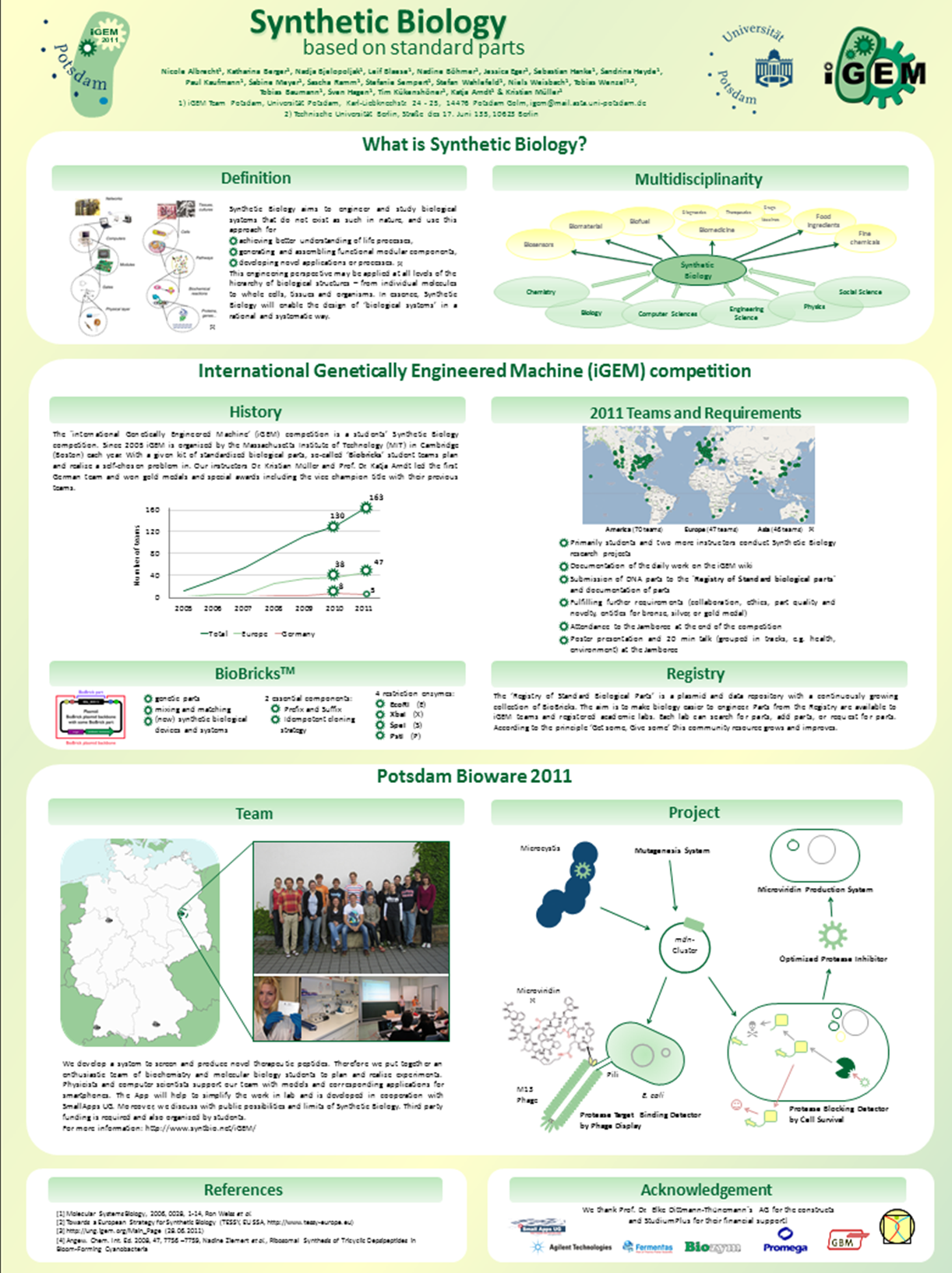
The Strategic Process Biotechnology 2020+ was hosted by the German Ministry of Education and Research in July 2011. This strategic meeting is organized every year. The purpose is to bring research facilities, companies and politicians together to discuss the development of biotechnology and synthetic biology in Germany in the next ten years.
The day started with an introduction from State Secretary Dr. Helge Braun and talks from different industry representatives. In the late morning we participated with a poster presentation together with this year's iGEM Bielefeld Team as well as the last year's Freiburg and Weimar-Heidelberg Arts Teams.
Throughout the poster presentation we had many interesting talks about iGEM. We discussed our idea with various people in terms of potential and application. Different thoughts were proposed about the project and about the Microviridin cluster. The feedback was great and encouraging. We also gave an interview to biotechnology.tv to promote our concept to a wide range of people (see youtube video below).
The lunch break was followed by a podium discussion about the scientific advantages which have been made throughout the past year. Highlights were presented and discussed by the speakers. In the afternoon several workshops took place. In the relaxed atmosphere novel applications and innovations were designed in role plays. It seemed that the search for novel natural therapeutics is a main focus in the arising decade of biotechnology in Germany.
This poster presentation on the Strategic Process Biotechnology 2020+ was a great opportunity and we are very thankful for all the ideas and new impressions. We would like to thank everybody for this experience.
biotechnologie.tv
Press Report
Young scientists from University of Potsdam participate in an international synthetic biology competition
For the first time an interdisciplinary group of students from University of Potsdam takes part in the international iGEM competition (international Genetically Engineered Machine). This competition is arranged by Massachusetts Institute of Technology in Cambridge for international teams every year since 2005.
The junior scientists from Potsdam develop a system for the detection of novel peptide based agents for therapeutical applications in human. In the process they use the properties of bacteria, in that case of cyanobacteria. These bacteria are capable of linking short protein parts in an unusual way. These properties are transferred to bacterial laboratory strains and optimized. As a result the students hope to find inhibitors, which e.g. can be used in regulation of blood coagulation.
The 15 students from 4th to 8th semester are guided by Dr. Kristian Müller and Prof. Katja Arndt, whose former groups were able to win gold-medals and special awards. The biochemistry students plan and perform the lab work. They are supported by physic students, contributing to the design of models, and informatics students, developing an application for smart phones. The work is aided by Dr. Elke Dittmann, Professor of microbiology. Moreover the students discuss the possibilities and borders of synthetic biology with the publicity and work on financing the project.
In the beginning of October all results and projects will be presented during the European Jamboree in Amsterdam and evaluated by a jury. The final round takes place in November in Boston.
University of Potsdam (German)
http://www.uni-potsdam.de/pm/news/archiv/up/date/2011/07/04/2011-135.html
Meeting the young minds
Children are the future and will follow our footsteps, if we guide them. We cannot start early enough to awake their interest in research by letting them feel like real scientists in the lab. Children are open minded and want to discover everything. It’s easy to inspire them with our work. The earlier we start to introduce people to science, the better are the chances to create endorsement and interest instead of fear and refusal of synthetic biology.
Therefore, we took the initiative and invited kids to our lab. We gave them a short and easy description of our work and aims at an adequate level. They assisted us at the lab and enjoyed tasks like pipetting. It was such a pleasure to see the fascination in their bright eyes. We think that such positive memories will last a lifetime.
 "
"
